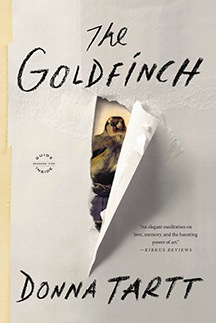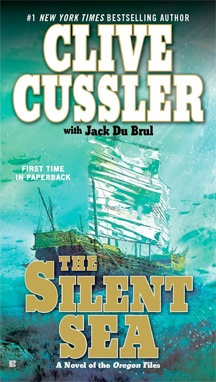A long and winding, beautifully written book with numerous disturbing story lines.
 My friend Barbara, an avid reader, recommended The Goldfinch by Donna Tartt to her Facebook friends, including me. I’d been looking for something modern and mainstream to read since binging and burning out (and subsequently dropping) the Arthur C. Clark (and ghostwriter) Rama series books. (Clarke’s original Rendezvous with Rama is a short masterpiece of science fiction; the long, drawn out books in the series that came afterward were some ghostwriter’s attempt to fill too many pages with unnecessary personal drama reminiscent of today’s reality TV shows that, quite frankly, annoyed and bored me. I was in the middle of the third book when I decided I’d had enough.)
My friend Barbara, an avid reader, recommended The Goldfinch by Donna Tartt to her Facebook friends, including me. I’d been looking for something modern and mainstream to read since binging and burning out (and subsequently dropping) the Arthur C. Clark (and ghostwriter) Rama series books. (Clarke’s original Rendezvous with Rama is a short masterpiece of science fiction; the long, drawn out books in the series that came afterward were some ghostwriter’s attempt to fill too many pages with unnecessary personal drama reminiscent of today’s reality TV shows that, quite frankly, annoyed and bored me. I was in the middle of the third book when I decided I’d had enough.)
On a whim, I looked it up on my library’s website, discovered they had an ebook version, and put it on hold. When it became available two weeks later, I checked it out and began reading on my iPad.
I soon realized two things about the book:
First, it was beautifully written. The author used words to expertly paint pictures of New York, Las Vegas, and other backdrops for the story that put me right in those places. Keep in mind that I’ve spent a lot of time in both places and I can assure you that she nailed every aspect of her descriptions. From grabbing a taxi in New York to wandering the streets of ghost housing developments in the desert outskirts of Vegas, she put the reader there expertly. She also managed to convey the moods of not only her first person narrator but the places and situations he was in. I realized almost immediately that I’d been stuck in a rut reading garbage fiction. This book was like a breath of fresh air for my brain.
Here’s a paragraph from near the beginning of the book to give you an idea of what I mean:
If the day had gone as planned, it would have faded into the sky unmarked, swallowed without a trace along with the rest of my eighth-grade year. What would I remember of it now? Little or nothing. But of course the texture of that morning is clearer than the present, down to the drenched, wet feel of the air. It had rained in the night, a terrible storm, shops were flooded and a couple of subway stations closed; and the two of us were standing on the squelching carpet outside our apartment building while her favorite doorman, Goldie, who adored her, walked backwards down Fifty-Seventh with his arm up, whistling for a taxi. Cars whooshed by in sheets of dirty spray; rain-swollen clouds tumbled high above the skyscrapers, blowing and shifting to patches of clear blue sky, and down below, on the street, beneath the exhaust fumes, the wind felt damp and soft like spring.
Holy cow. Are you there with me? I can see the yellow of the cabs speeding by, all with their “hired” lights on, while the doorman, in his cap and long coat, steps out onto the avenue, arm held high with his whistle blowing wildly in his mouth, trying hard to get a taxi while mother and son wait under the arched awning in front of the building. I can hear the car horns and other doorman whistles, see wisps of steam rising from the manhole covers, smell the pungent odor of flooded storm drains. All the while, pedestrians rush by under umbrellas, collars turned up against the driving rain as they splash through small puddles on the sidewalk in hopelessly wet shoes.
So much of the book is like this for me.
Second, it was extremely long. I didn’t realize how long it was in real pages until today when I looked it up on Amazon just to get that piece of information: 755 pages. Wow! And my library loan gave me just two weeks to get through it!
The story follows the narrator through the tragic loss of his mother and the morally questionable acquisition of a 17th century Dutch masterpiece, The Goldfinch. Throughout the story, Theo describes the events of his life, from being shuffled from one home to another, left on his own to discover drugs with a friend to his troubled adult life. I don’t want say more because I don’t want to spoil any of the plot lines for readers. Amazon’s description, which was obviously written by some publishing house marketer who didn’t bother to read the book, is a bit misleading.
Simply stated: the story is dark and although I never actually disliked the first person narrator, I kept thinking over and over how stupid he was being to screw up his life the way he was. As one reviewer who found the book too sad to finish put it, “Just when I think it will get better something else bad happens.” A note on Amazon says that 172 reviewers made a similar statement. I would have, too.
But it was the beauty of the writing and my hope for a happy ending that pulled me through the book. Reading in bed before dawn or curled up on the sofa on a foggy afternoon, I paged through it, marveling at the quality of the prose while lamenting the main character’s often self-inflicted misfortunes. Although friendship was a major theme throughout the book, Theo’s friend was not a good influence and I had a lot of trouble getting past that until the third part of the book.
I was rewarded at the end with two passages that I bookmarked because they had special meaning to me. Both occur near the end of the book, in the narrator’s lengthy summation of his story and what he learned from what he’d been through.
Theo talks a bit about the goldfinch in the painting, a small bird fastened to its perch with a length of chain. He talks about the bird not being afraid of its surroundings despite its tiny size. About it not being timid and not being hopeless and refusing to pull back from the world. And then he says:
And, increasingly, I find myself fixing on that refusal to pull back. Because I don’t care what anyone says or how often or winningly they say it: no one will ever, ever be able to persuade me that life is some awesome, rewarding treat. Because, here’s the truth: life is a catastrophe. The basic fact of existence — of walking around trying to feed ourselves and find friends and whatever else we do — is catastrophe. Forget all this ridiculous ‘Our Town’ nonsense everyone talks: the miracle of the newborn babe, the joy of one simple blossom, Life You Are Too Wonderful To Grasp, &c. For me — and I’ll keep repeating it doggedly till I die, till I fall over on my ungrateful nihilistic face and am too weak to say it: better never born, than born into this cesspool. Sinkhole of hospital beds, coffins, and broken hearts. No release, no appeal, no “do-overs” to employ a favored phrase of Xandra’s, no way forward but age and loss, and no way out but death. […]
And — maybe it’s ridiculous to go on in this vein, although it doesn’t matter since no one’s ever going to see this — but does it make any sense at all to know that it ends badly for all of us, even the happiest of us, and that we all lose everything that matters in the end — and yet to know as well, despite all this, as cruelly as the game is stacked, that it’s possible to play it with a kind of joy?
Not exactly the kind of quote that makes you feel good about life. But in my own life, it has a lot of meaning.
Although I can’t complain about most of my life — I’ve worked hard and played hard and enjoyed life within my limited means — the events of the past two years or so have taken a serious toll on me. They’ve made me see life from Theo’s point of view. Life’s a real struggle sometimes, especially when difficult, unexpected situations are thrown in your path. A marriage gone sour for reasons you can’t comprehend. A formerly loving spouse lying, cheating, and committing a never-ending series of hurtful acts against you. Stranger-than-fiction situations triggering PTSD-driven responses that cause a chain reaction of apparently unsurmountable problems.
This is the catastrophe Theo is talking about, complete with broken hearts and no appeals or do-overs. Unlike Theo, however, I didn’t bring the catastrophe on myself — it was thrust upon me by others. I suppose I should consider myself fortunate that I haven’t had to deal with it until recently.
I struggle now to move forward with as much of the joy as I can muster. My friends and family tell me I’m doing an amazing job, that I’m a strong woman and will get through my temporary setbacks. I know they’re right. I have plenty of good days among the bad. But I also know the feeling of utter despair that Theo shares throughout the book.
The other passage I bookmarked reminded me a bit about what’s driven me my entire life.
In the book, Theo does self-destructive things: drugs, theft, fraudulent transactions. He knows these things are wrong, but he does them, sometimes justifying them in his own mind to make them more acceptable. Sometimes he’s just too weak or lacks the willpower to stop. In this lengthly passage, he questions the “norms” and what people are expected to do with their lives.
I look at the blanked-out faces of the other passengers — – hoisting their briefcases, their backpacks, shuffling to disembark — and I think of what Hobie said: beauty alters the grain of reality. And I keep thinking too of the more conventional wisdom: namely, that the pursuit of pure beauty is a trap, a fast track to bitterness and sorrow, the beauty has to be wedded to something more meaningful.
Only what is that thing? Why am I made the way I am? Why do I care about all the wrong things, and nothing at all the right ones? Or, no to take it another way: how can I see so clearly that everything I love or care about is illusion, and yet– for me, anyway — all that’s worth living for lies in that charm?
A great sorrow, and one that I’m only beginning to understand: we don’t get to choose our own hearts. We can’t make ourselves want what’s good for us or what’s good for other people. We don’t get to choose the people we are.
Because — isn’t it drilled into us constantly, from childhood on, an unquestioned platitude in the culture — ? From William Blake to Lady Gaga, from Rousseau to Rumi to Tosca to Mr. Rogers, it’s a curiously uniform message, accepted from high to low: when in doubt, what to do? How do we know what’s right for us? Every shrink, every career counselor, every Disney princess knows the answer: “Be yourself.” “Follow your heart.”
Only here’s what I really, really want someone to explain to me. What if one happens to be possessed of a heart that can’t be trusted — ? What if the heart, for all its unfathomable reasons, leads one willfully and in a cloud of unspeakable radiance away from health, domesticity, civic responsibility and strong social connections and all the blandly-held common virtues and instead straight towards a beautiful flare of ruin, self immolation, disaster? Is Kitsey right? If your deepest self is singing and coaxing you straight toward the bonfire, is it better to turn away? Stop your ears with wax? Ignore all the perverse glory your heart is screaming at you? Set yourself on the course that will lead you dutifully towards the norm, reasonable hours and regular medical checkups, stable relationships and steady career advancement, the New York Times and brunch on Sunday, all with the promise of being somehow a better person? Or — like Boris — is it better to throw yourself headfirst and laughing into the holy rage calling your name?
It’s not about outward appearances but inward significance. A grandeur in the world but not of the world, a grandeur that the world doesn’t understand. That first glimpse of pure otherness, in whose presence you blew out and out and out.
A self one does not want. A heart one cannot help.
I was raised to believe that people follow a predestined path: grow up, go to school, get a job, get married, buy a house, have kids, retire, have grandkids, die. Somewhere along the line, “get a job” turned into “have a career” and that career was supposed to be in an office working 9 to 5 for a paycheck.
But something about me made me question that path when I was in the “go to school” phase. You see, rather than getting that office job with good career opportunities, I realized I wanted to be a writer. To say I was discouraged is an understatement, but I toed the line like the relatively obedient kid I was. It wasn’t until years later, when I’d invested quite a bit of time in the “have a career” phase that I realized how unhappy I was.
You see, I didn’t follow my heart. I followed someone else’s “life formula” and that formula just wasn’t working for me. I got off the path I was on and started fresh on a new path. And I haven’t regretted it one damn bit. The only thing I regret is not getting on that path in the first place and wasting 8 years of my life doing something I really didn’t want to do.
My situation really isn’t anything like Theo’s in the book. Theo’s path was self-destructive, mine was constructive. But the point this passage reinforces is that we need to follow what our heart tells us is right, even if it doesn’t conform to what’s “normal” or what’s expected of us. I’m fortunate in that my heart usually steers me onto a path that I do want, one that’s good for me and others around me.
It just saddens me that people close to me have ignored their heart in favor of the easy life formula that’s considered “normal.” I know they will eventually regret taking the path they took — if they don’t already regret it.
Anyway, that’s my takeaway from this book. I recommend it if you like well-written prose and you don’t mind a dark story with a brighter ending.
One last thing. In prepping to write this, I Googled The Goldfinch. I wanted to see what the painting looked like. I was disappointed. What do you think?

 In my never-ending quest for light reading while I sit around in Wickenburg waiting for my marriage to be terminated, I picked up a copy of
In my never-ending quest for light reading while I sit around in Wickenburg waiting for my marriage to be terminated, I picked up a copy of 
 The best way to illustrate this is with a passage from a “Clive Cussler” book I just finished. Let me present two versions of the opening paragraph and offer a critique before I explain why I put Mr. Cussler’s name in quotes.
The best way to illustrate this is with a passage from a “Clive Cussler” book I just finished. Let me present two versions of the opening paragraph and offer a critique before I explain why I put Mr. Cussler’s name in quotes. I just finished reading Stephen King’s
I just finished reading Stephen King’s  Two days ago, one of my Facebook friends posted a status update that linked to a CNET article titled “
Two days ago, one of my Facebook friends posted a status update that linked to a CNET article titled “